#to look at our communities and our culture and how being from the south interacts with our other identities
Explore tagged Tumblr posts
Text
I hate the attitude people have of “oh this group I don’t care about at all/as much as others is speaking up about their oppression and the problems they face, I can’t believe they think they’re the most oppressed people in the world 🙄” like speaking about about the issues we face isn’t claiming we suffer more than jesus or some shit, especially when those issues largely go ignored by the same people who consider themselves progressives! People in the southern U.S. are oppressed actually! There is so much racism and classism weaponized against those from the south, and the people who are hit hardest by that will always be those in marginalized communities, southern people of color, southern queer people, southern disabled people, you get the fucking picture! And yeah I think we should be allowed to speak up about this, because self righteous liberals up north will lock their car doors when a person of color walks by and then preach to southerners online that we’re all just too poor and stupid to be as good as them! They’ll blame us for our own oppression and tell us to just pack up and abandon our homes and everything we know otherwise we aren’t worthy of their sympathy. Of course I ain’t saying that southerners are the most oppressed group in the whole world but we should still be allowed to talk about the problems we do face, not just from our governments and our neighbors but from people elsewhere who would rather blame us and mock us and leave us behind than DARE to associate with us.
#I saw a post and it pissed me off but I’m trying so hard not to argue online with people#almost all of the highest poverty rates in the country are in the south#transgender people are rapidly having our rights stripped away by our state governments#we’re losing access to basic medical care and they’re trying to criminalize leaving the state for it too#and we don’t get. help or solidarity or sympathy from people up north#we get told it’s what we deserve because OTHER people voted for some guy and he won#but we live here so we deserve it#I ain’t forgotten how people acted when we got hit with that blizzard#how people said we deserved it as a red state. how people said they would care if some Texans hadn’t voted for trump#people were dying. who do you think that effected the most?#it certainly wasn’t the most wealthy among us#it was the homeless. the poor. the disabled. primarily people and families of color. immigrants#and people were just so cruel about it#don’t call yourself a progressive or whatever if you can’t stand with southerners#if you’d rather paint us all as racist white trump supporters than take even a moment#to look at our communities and our culture and how being from the south interacts with our other identities#you don’t get to just throw us away because we don’t look good enough for you
4 notes
·
View notes
Text


Chainsmoking His Love 16: The Sixteenth Cleanse
Zeke Jaeger x Reader // follow #CHLZeke for updates // n.s.fw mdni
POV: second person, AFAB reader, feminine pronouns Chapter tags: nippIe play, vaginaI fingerιng, handy, praise, bathtub sex Chapter length: 4.3k

The heat pooling in your chest betrays the tone of your voice. “You’re impossible.” “Am I?” Zeke asks, his voice soft now, his fingers brushing idly at your side. He’s testing the waters – literally. “Or am I just honest?” You don’t have a chance to respond before his arms draw your body into him through the bathwater, the motion less like a trap and more like a silent plea to surrender. The warmth of his chest envelopes your back, his steady breathing slowing you. He kisses your neck, right at the nape, right where your spine crawls south.

♡ read more after the jump or on ao3 ♡ // ♡ spotify playlist♡
I have a very strict adult-only interaction policy. Ageless, blank, and clearly minor-run blogs that interact will be blocked. If you have questions about what that means, please read the byf in my pinned post.
“Tell me something about yourself,” you say, turning your neck against the cool barrel of the copper bathtub. Over its rim, Zeke raises his eyebrows and folds the newspaper slipping between his fingers. “Something I don’t know about you.”
“What would you like to know?” he asks in return. He stretches his legs along the floor and drums the thin paper idly. “Something about my terribly boring childhood? Something about the Titans? You want a war story?”
You shrug. The warm water spills over your shoulders.
“Do you like being… a Titan?” you say after a moment’s contemplation of the phrasing.
He reaches to the small linen cart you had snuck from the laundry into his bathroom chambers, placing his paper down and picking up instead the small glass of wine balanced on the shelf. “Like,” he snorts. “Do you like not being a Titan? Do you like being just a person? Shall we survey Porco and Reiner and Pieck – see if they like it?”
It’s cold. But then Zeke laughs, and you laugh, too.
“As far as it goes, or -” he says, and interrupts himself by taking a sip, “by it, I suppose life itself, it’s certainly never perfect. I think at least we’d all agree on that.”
You wait for him to continue.
He takes another sip.
“Well,” you say into the pause, “how does it feel to be a Titan?”
“Feel?”
You look away, to the back of his head reflected in the mirror. His voice is evasive, not with the coyness you’ve gotten accustomed to, but some sort of real communication barrier. Cultural barrier. “Do you feel more natural like this or… like that?”
“I see,” Zeke says. He sets the wine glass down on the floor with a faint clink on the tile. His response sounds relieved, as if he had shared the same hesitation. “Something that you should ask Pieck in particular.”
He stretches his arms in front of him, strong forearms dusted with ginger hair.
“To me, ‘natural’ isn’t a word that describes either shape. Is it natural that we tie trousers around our waists? Is it natural that we groom the length of our hair and fingernails? It’s a condition of my life the same as any other. A condition that’s shaped me – same as preferring colder weather, same as liking tomatoes and disliking celery. No – more like being a subject of Ymir. Not what it means politically in this country or in this city; but I mean what is in your blood, in the tongue shaped in childhood to speak the language of your people, in what your father’s mother’s parents instilled in your lineage. You don’t ask for any of those roles in life, you just have them when you are born.”
He lets out something under his breath that almost sounds like Reiner, but he doesn’t repeat himself. He turns his hands into fists and circles them through the air. The bone cracks and you wince.
“So you were born a Titan?” You reach for the bar of soap and inhale it a moment – lavender, and perhaps, a faint tobacco leaf – and roll it between your hands. The lather begins to foam.
“No, that’s not how it works,” Zeke says, and he doesn’t elaborate further.
“Well. But,” you say as the muscle of his forearm weaves in his stretching, “you have power. More than I, but you’re their commander. Reiner, Porco. You do have some freedom that we don’t.”
You spread the lather across your skin absently.
Zeke makes a sound like a snort. He relaxes his arms into a wide shrug. “What freedom is there, what power, if someone’s holding onto the other end of the leash? You think that turning into – that – makes me free? In that form, I’m more bound to them than even like this.”
His hands fall, slapping sharply against his thigh.
You sink lower in the deep tub. The water laps at your chin.
“But you can do something,” you mutter, staring at the ripples shifting through the water as you draw your knees to your chest.
He picks up the wine again. “Believe me, I am. But let’s turn this around. Tell me something about yourself.”
You inhale slowly, shifting against the edge of the tub. “You know,” you say, letting your tone turn light, “I don’t think you’ve ever asked me that question before.”
“I haven’t?”
“No.”
Zeke smiles. His eyes remain steady on you. He leans forward, turning the wine in his hand for another sip before placing it down. “Alright. Then start telling me. Why are you here?”
You run your fingers along the lip of the tub, watching the water bead on your skin.
“It’s a good job,” you say. “I mean, the pay is really, really good. It’s enough to send home and still live off. Lodging is included for us, too.”
“You barely get weekends and holidays off.”
“Well,” you say, and lift your foot from the water to examine the pruned texture prickling at your toes. “Where would I even go?”
Not like we ever go anywhere…
He offers nothing. You lower your foot.
“So all of that is worth being right in their line of sight?” Zeke lifts two fingers in mock crosshairs and narrows his gaze as if taking aim at you.
“Well, you should know,” you say, and smile at the gesture, “isn’t it easier to get away with things right under their nose?”
“Oh, you little rascal, you,” Zeke laughs. His teeth shine. “Have I been such a terrible influence?”
He moves now. His arms rest on the copper rim of the tub, his faces inches from yours. His hand moves, and you lean your face towards him. He reaches past to tug at the handle, and hot water comes gurgling once more from the faucet.
“Scoot up.”
“What?”
“You’re hogging all the hot water,” Zeke says. An eyebrow quirks up as if daring you to object.
“Are you serious?”
“Have I ever struck you as someone who’s not serious?”
“I don’t know if there’s room” you say, but he’s already unbuttoning his shirt in a casual fluidity. The lean, muscular lines of his torso come revealed. The faint smattering of hair across his chest weaves a pattern in the soft light.
“There is,” he says in a tone so matter-of-fact that it ever-so-slightly stirs that low instinct of jealousy below your belly.
You sink into the water, either to make room, or to hide.
“Well?”
He discards his clothing and runs his hand along the side of the tub. You push your knees forward and feel him step into the tub behind you, hear the water slosh with the weight of his limbs displacing lazy splashes over the side.
“Come on, lean back.”
The water laps against your arms as his legs bracket yours. He catches your wrist beneath the water and runs his thumb against the back of your hand.
“Are you trying to swim away? You’re quiet.”
You hesitate, and his thumb traces a slow line against your wrist.
“I have another question.”
“You do?”
His tone is mockingly sweet. Heat rises to your face. Zeke’s hand slides in the water, pressing gently against the curve of your waist. His cock twitches at your flank, and your body aches in response.
“Another query about my Titan blood?”
“No,” you say, and you’re glad that he can’t see your face. “It’s a silly question.”
His hands lock at your waist. “Then it’ll have a silly answer.”
The heat pooling in your chest betrays the tone of your voice. “You’re impossible.”
“Am I?” Zeke asks, his voice soft now, his fingers brushing idly at your side. He’s testing the waters – literally. “Or am I just honest?”
You don’t have a chance to respond before his arms draw your body into him through the bathwater, the motion less like a trap and more like a silent plea to surrender. The warmth of his chest envelopes your back, his steady breathing slowing you. He kisses your neck, right at the nape, right where your spine crawls south.
“It’s silly,” you say again. “But I just – have you ever shared this tub with another woman?”
His arms tighten, a conspiracy between himself, the water, the tub, to keep you close.
“And I mean – more than that. Have you been close like this – have you shared yourself like this, with another?”
“You think I warmed my bed with mindless Titans on the island?”
He’s trying to make you laugh and you refuse to fall for the distraction. You scoff louder than you intended.
“You know what I’m asking,” you say plainly, refusing to engage with the riddles.
Zeke keeps his grip on your waist firm as he adjusts himself to better fit the confines of the bathtub. “I do know. I didn’t know it mattered to you.”
You stay silent. He stays silent a moment longer.
“I was blessed to enjoy more of my teenage years as a human than others could. Did you know that Reiner took on the mantle when he was twelve?”
You will not ask after the breadcrumbs left in those sentences. Zeke sighs, as if he had hoped you to. His chest swells and collapses at your back with the breath.
“So, I had what some – what I – would consider to be the typical teenage experience. Dates at the pier after training at the gymnasium. Passing notes and promises in class. Snuck a few dates into the basements of taverns with no means to pay for our drinks.” He pauses. “Spent a few nights in rooms I also had no means to pay for.”
You fidget. He kisses the back of your neck again.
“But that was a lifetime ago. It truly feels that way. You know I’ve been a little occupied.”
“Yes, with being a giant monkey.”
“And,” he says, tightening his arms, “with someone else.”
It makes you smile and you’re glad he can’t see it.
“Come on,” Zeke wheedles, and his hands begin to slowly ride up, thick through the water. “You can’t think I’ve had much of a chance to climb out of the monkey suit and into someone’s skirts.”
“I can’t, but I also can’t think you’ve been celibate that whole time as well.”
“I’ve heard,” Zeke muses, “that there are actually those that prefer seeing me as a giant monkey.”
You have to turn at that, and the corners of your cheeks are plump with a smile. “You’re ridiculous.”
Zeke kisses your cheek, and then, with a deliberate slowness, your mouth. “But you’re still here.”
His thumbs rise and first he traces around your chest. He drips over your collarbones, watching your shoulders move concave with each breath, before moving back to your breasts. He goes in slow circles, slippery in the water against the texture of your nipples. It brings a hot rush between your legs almost instantly.
His cock is stiff against your back again.
“You,” you pant, your neck beginning to ache, “are trying to distract me.”
“I’m not,” Zeke says innocently. “That’s the end of it all. I swear.”
You sigh. The distraction is working. His thumbs wash water over your skin, and your nipples ripen to peaks. You fidget back.
“Then tell me – Zeke, Zeke. Why do we have to hide so much?”
Zeke’s hands stiffen. He hides it with a pinch that makes your next words break into a high squeal, something so loud you clap a wet hand over your mouth in reflex.
“Isn’t it just easier like this? We each have work to do. And Pieck knows, Porco knows, Reiner knows. That’s all that matters. You want to, what, report to Magath?”
“No, I guess…”
You let your voice trail off as his fingers flatten, arch again.
“And did you really fear,” Zeke whispers, “that you were sharing this space with another?”
“N-no -”
“I thought you knew better than that. I’ve never taken your head to be one filed with silly fluff and candy floss.”
All you can do is keen, your voice high, when he slips a hand down between your legs. He’s quickly ridding your head of any thoughts at all. You try to force your knees apart, but the muscular band of his thighs separating you from the tub in the narrow space has left no room for more movement.
“I thought you trusted me.”
“I – do – oh – ”
Your head is tipped back, resting on his shoulder. Your hand falls, limp. His thick fingers sweep in measured caress through the water and over your skin. He cups a hand between the plump of your thighs and you tighten automatically at it. He chuckles hot at your face and kisses your cheek again.
“I was a good little boy,” Zeke says, as your hips move between his hand, the smooth metal of the tub. “I took care of my toys. I even shared my toys. But now I think I only want to play with this one. And she’s mine alone, now.”
You arch your back, squirming into his frame. He lifts his hand He nips his teeth at your earlobe and his breath is quickening to the same pace as the clumsy circles he draws over your clit. The water laps at the back of his hand, the valleys between your crowded knees.
“Right?”
You close your eyes and let out the yielding, “Mmhmm.”
Water slides over your soaped body like silk. His touch doesn’t bring the usual friction of skin on skin, but the slickness has its own seduction. The coiled spring that rests heavy below your hips tightens, weighs you down in its steady, impatient pressure. It feels as though you could leak into the bath.
“I’m…”
“You’re so wet,” Zeke whispers. “I can feel it on you.”
With that his fingers slip between your folds, teasing without entering. You turn your head into the crook of his neck, and your arm is up, reaching desperately to rake fingers through the back of his head.
“Zeke…”
“Can’t fuck you here, can I? Just too narrow,” he croons. “I don’t think the tub was made for two after all, but I’m not complaining.”
He traces his hand back down your body to find your other, take it, and bring it back to your chest. He guides your fingers to your breast and slides wet fingers into a V, into a pinch, to show the pressure he likes to apply.
“I like playing with my toy,” Zeke says, and the words growl through his teeth and rumble at your back. You open your eyes to guide your lips to his neck, where you miss the kiss you intend and instead land at the border of his beard curling under his chin.
He’s dancing his fingers along the slick between your legs and drawing it out of you like some magician’s never-ending display of magic. Playing indeed, toying with you right on that line as each touch slides over your body.
It won’t take long like this, and he knows it. He knows your body well by now, speaks the same nonverbal language as the impatient grind of your hips. So this is how he strings you out moments longer, moments that feel like hours, until at last, you let it burst from your lips:
“Please, please, more.”
“More,” Zeke says in a voice bordering on mocking, but then his fingers are in you and all is well. You lean forward, almost choking on your inhale. His arm keeps you down and tucked against him.
“More, more, for my girl,” he says thickly. With the grunt of his words, he forces two fingers higher, bends them, and crooks them.
“Oh – ”
“Mmhmm.”
It’s as if the ecstasy you feel is contagious. Zeke begins to fuck you with furious fingers, as if it were enough for him to feel. His breath is coming from his mouth, and you close your eyes for a dizzying moment, wishing that your forehead could be against his, your mouth on his, his body over yours instead of the unforgiving air waiting outside of the shallow cradle of the tub. Water cascades furiously. You can hear the splashes and puddles gathering on the floor.
Neither of you remotely care.
You toss your head against his chest and whine, clutching at his arms as if to bring him closer, to throw him off.
“I’m – I’m gonna – it’s –”
“Fast,” Zeke murmurs. “Come on then, come on, come. I want you to come.”
He wants you to come, and those words are the anchor to bring you through. His fingers almost tense in you and you prepare to give an outburst of protest, but the slowing is just a moment to re-angle before his fingers turn furious. Zeke brings his other hand down to your clit again and you strain, a foot pushing against the edge of the tub, a wave going over the edge.
“Fuck!”
The sound echoes and dances along the tiles.
It ripples out of you as that coiled spring of tension releases in orgasm. Something about the surrounding basin of water makes each internal clench feel as though it leeches out of you in pulse. You almost expect to look down to milky white rivulets, as if it had been that strong.
You don’t even realize when his hands have come away from you. You’re sitting up, your stomach muscles aching and knees cramped.
“Oh my… god.”
“Fuck,” Zeke mutters low in agreement behind you.
You raise your hands to your face and slowly press into your palms, breathing heavily. The lights spin around you when you raise your eyes again.
Zeke’s arms languish back in the water. You reach over him to clutch at the sides of the tub.
“Are – d’you need help getting out?”
“No,” you manage, the foggy heat still rising in your head.
When you get yourself turned, kneeling now to face him with the water up to your elbows, Zeke looks as flushed as you feel. He’d taken his glasses off at some point and they lie half-folded and fogged up on the tiled floor in a shallow puddle. His cheekbones are pink, and his smile is fat and lazy.
You inhale, exhale, steady yourself.
“You want to play a little more?”
“I do,” you say softly, reverently, and half-crawl closer, a hand sliding along the copper floor between his legs. You reach up and trace the lines of his muscle, higher to his chest. Zeke’s hands are firmly braced along the tub as he leans forward and kisses you. The mist and humidity of the room melts your lips together with ease.
The kiss is soft and short.
Your hand wraps delicately around his erection, the water guiding the ease of your motion before skin meets. Zeke hisses as you begin to pump, awkward, in the water, but as the flush reddens on his cheeks your grip tightens and you work up. Down.
“Oh,” he says – he moans.
The sound of it almost makes you melt anew. You can feel your lip draw back in a half-smile, and you lower yourself slightly, your knees tight between his and the curve of your waist sloping to create a heart in your hips. Zeke sucks in his breath.
Down, down, firm and up.
You cannot lower your mouth to him, and you understand his frustration with the limits of this tub; but while you are knelt down between his thighs, you can still let your thumb work as his have. You swirl around his tip, teasing the slit when you find it, coaxing each slippery bead out.
“Oh – fuck – ”
What you touch is soft. What your movements of skin dance over is a hardness beneath. Zeke is clutching at the lip of the tub with pruned fingers. You watch the whiteness seep into his knuckles and think, in a fresh flashback of memory more than words, of what made his touch wrinkle so. You pull back for a moment and move your hand between your legs again.
Slick of your orgasm still remains webbed at your thigh. Some had not been washed into the water. Zeke sees your reach and makes that delicious, raw, moaning sound again, knowing the thought before it even formed in your mind.
You want to hear it again, and so you gather your fingers and stuff your hand between your legs to swollen, dripping folds where you can bring it back to Zeke. You have the urge to taste it, or to draw it across his lips, if there were any more.
Zeke moans again.
His eyes almost roll back in his head. He lifts a hand, clutches it to his mouth and groans when your hand glides round him again. His abdomen muscles contract so slightly. His cock firms in your hand.
“Come – up here,” Zeke says, ragged. “Give me a kiss.”
You push yourself up on your elbow, and he watches your hips sway and settle in position. The pace of your pumping slows as you balance yourself, but Zeke extends that hand to you, almost crushing with a strength at the back of your head, and hunches forward to have his lips meet yours again. His fingers trace the outline of your cheekbones as he kisses you harder, deeper.
Your own fingers tighten, and a sound like no other tears from his throat into your lungs.
“Come on,” you whisper, and the sound of it is his own undoing. His hand tightens on you as his hips jerk upward. You tear away from him with regret, but watching him ride this wave is almost fascinating. Zeke is thrusting into your fist, fucking your hand as you have fucked yourself on his touch, as the water sways and lurches in currents around your bodies.
“Come on, come on,” you say again and again in soft command.
“Oh – ”
Zeke’s climax claims him. His cock jumps in your hand and your gaze is adoring as the pulsing swells. He has his head back in a delicious agony, blonde hair spilling over the rim of copper, his mouth just barely open. His collarbones take shape with each sucking breath. Droplets of water shine in his beard like individual diamonds.
He shoots on his chest, your fingertips rolling along him.
Zeke groans, something animalistic and beastly that makes your spine roll.
“Oh,” he says again, and he grabs for your wrist. His neck snaps forward, and it takes a moment for his eyes to find yours.
“That – fuck,” he says – groans – and then droops his chin, as if the battle to find words exhausts him. But then he groans again with more coherence. “Oh, fuck. I’m going to have to wash up, huh.”
“I didn’t even finish my bath,” you say, but the words are delighted and lack any trace of sourness.
“I am sorry about that,” Zeke says in a tone that implies he will not be leaving you to return to it.
You sigh and haul yourself from the tub. Your legs, though cramped, have regained some strength that orgasm saps from you; but between your thighs is still a heavy weight, a physical memory of his touch. Zeke remains immobile in the tub. Perhaps he simply cannot move yet, and, with a slightly haughty triumph, you would believe that.
You reach for a thick white towel neatly folded at the bottom of the laundry cart, and wrap yourself in it like a cloud.
“The truth is,” Zeke says suddenly – and it isn’t the words, but the somber tone, that startles you – “that it isn’t safe.”
Your feet turn back to the tub, where Zeke is sitting forward now in the cloudy water. His elbows are outstretched on his knees, and he cracks his finger joints now in hesitant, uncomfortable motions.
“If we were to be more. If we were to be seen as more,” he says. His voice is faint, somehow. Distant. But grounded, with none of the usual slyness or song.
Playtime is over.
You clutch at the towel and step closer to him.
“What do you mean?”
“I…” Zeke stops, rubs the back of his head. The hair streaks dark where the wet hand touched the strands. You almost reach out for him, prepared to tuck the towel under your armpits and sink to the wet floor, but he hasn’t even tilted his head back to look at you.
The wall is back up.
“I will tell you one day,” he says. “I will explain.”
You wait, but he offers no more.
“Well,” you say, slowly. “Then, we can talk about it later.”
Zeke makes no sign that he’s heard you. He fidgets with his hands again and says nothing. You wait a moment longer.
“There’s a washcloth and towel on the bottom rack,” you say at last. You nudge the cart a little closer to the tub, and Zeke nods at that.
“Thanks. I won’t be long,” he says. Some strength has returned to his sounds, but he still has not turned to you.
You hesitate, as if hoping for something more, some form of guidance or next clue. And when it does not come from Zeke, you turn and walk back to the bedroom, closing that dividing door behind you. You shimmy out of the towel, and slip a dress shirt of his off the hanger to button up to your throat. Easy to add to the laundry cart when you slide it out in the morning as your cover, with any other dirty clothes. Your fingers freeze in a fist for a moment on the buttons, a motion that shocks you.
You climb into his bed and turn down the covers, staring up, up, the black expanse out the window beyond. You refuse to look at the light seeping under that door. You try to organize your thoughts, to think of what to say when he gets out. But sleep steals over your bones with a devious speed, and drags you easily into the realm of dreams before Zeke comes to bed.
chapter 17 (tbc)
#aot#aot x reader#ao3#ao3fic#ao3 crosspost#aot zeke#zeke x reader#zeke yaeger x reader#zeke x you#zeke yeager x reader#zeke yeager x you#zeke yeager#zeke jaeger x you#zeke jaeger x reader#zeke jaeger smut#zeke jeager x reader#zeke jaeger#zeke jeager smut#CHLZeke#daryafics
25 notes
·
View notes
Text
I realized that if I'm disappointed in the transmission of real information about Sudan and the Congo, I can just make the posts myself!
I am not surprised that people haven't been provided a strong understanding of the violence in the global south, but I *am* mad about it.
So let's talk about Sudan and the Congo
Since 2003 or so, an estimated 450,000 Sudanese refugees have fled to Chad, looking for safety from routine waves of ethnic cleansing committed by the Rapid Support Forces and their state/civilian allies.
While the Massalit make up the majority of those attacked, many other ethnicities are included amongst victims. It is NOT a religiously motivated cleansing, as most of those being victimized as well as most of those doing the victimizing are Muslim, and communicate the foundations of the violence as being the result of ethnic-cultural divides in the region current social system. Many of those speaking against the ethnic cleansing occurring agree, and also add that economic interactions appear to be major driving factors in who is targetted and when.
The Congo, meanwhile, has been going through it's own ethnic cleansing. One that has been more or less ongoing since 1996. An approximated 6mil people have been killed since.
Due to this relationship between economic motives and targets, ongoing desertification has been exacerbating violence in the region for years by making resources scarcer, more precious, and less stable to access.
The primary factors being credited with responsibility for this desertification and resultant resource volatility?
Climate change and human impact on the environment (via societal features such as urbanization, agriculture, waste management services, social welfare services, deforestation and bush removal, etc)
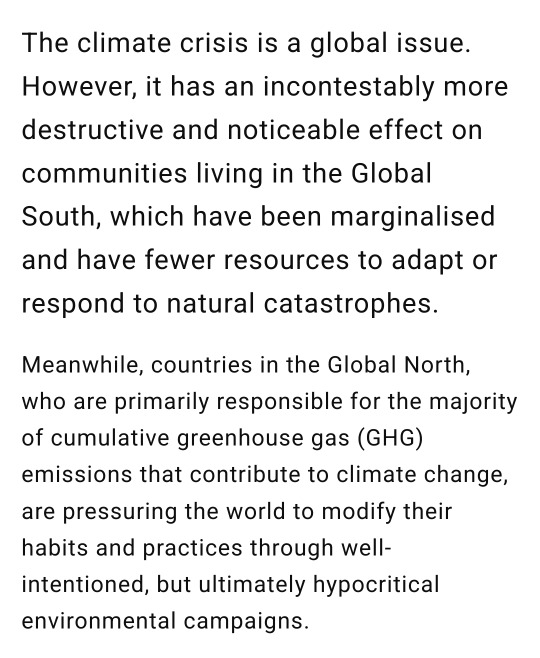
From FairPlanet ^
Funny how the global north causes lethal climate change but the global south is forced to die from it.
Funny how the global north forces the environmental recovery conversation to avoid study of environmental imperialism and remain solely focused on "incremental changes that can protect future generations". Whose future generations? What about the people dying NOW because of environmentally toxic industries??
And Nasreldin Atiya Rahamtalla via the International Journal of Social Sciences and Conflict Management says the following:

Hmm, I wonder why local power and social welfare infrastructure in Sudan and especially in Darfur might be diminished from previous governance:
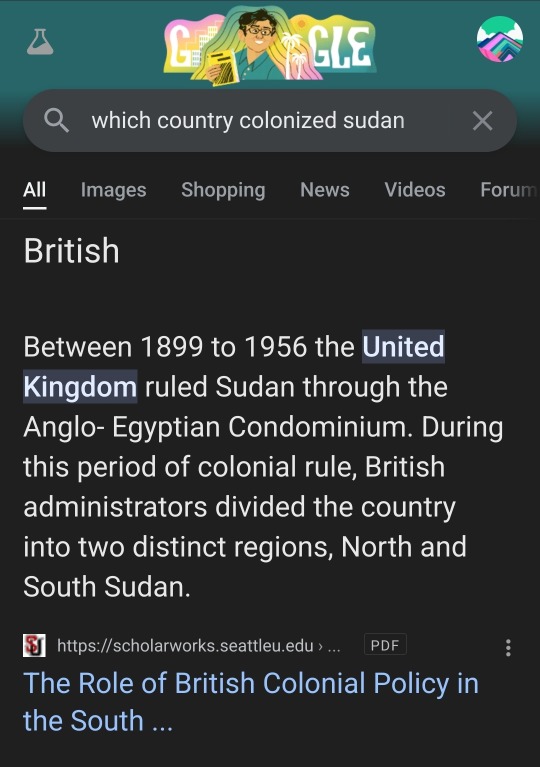
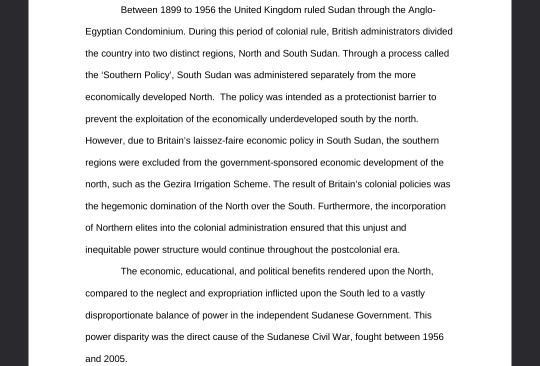
It's almost like the British had a habit of pitting different regional communities against each other along enforced ethnic lines while pillaging some and sparing others, then blowing the whole governance network in a temper tantrum on their way out the door during decolonization, a method of inflicting one last violemt devastation and sabotage peaceful futures most often epitomized by Rwanda and the Belgian Empire:
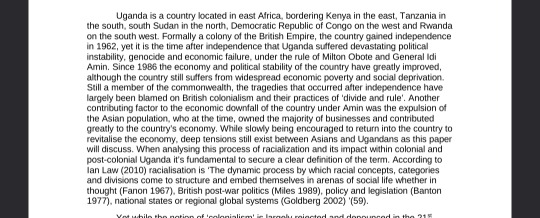
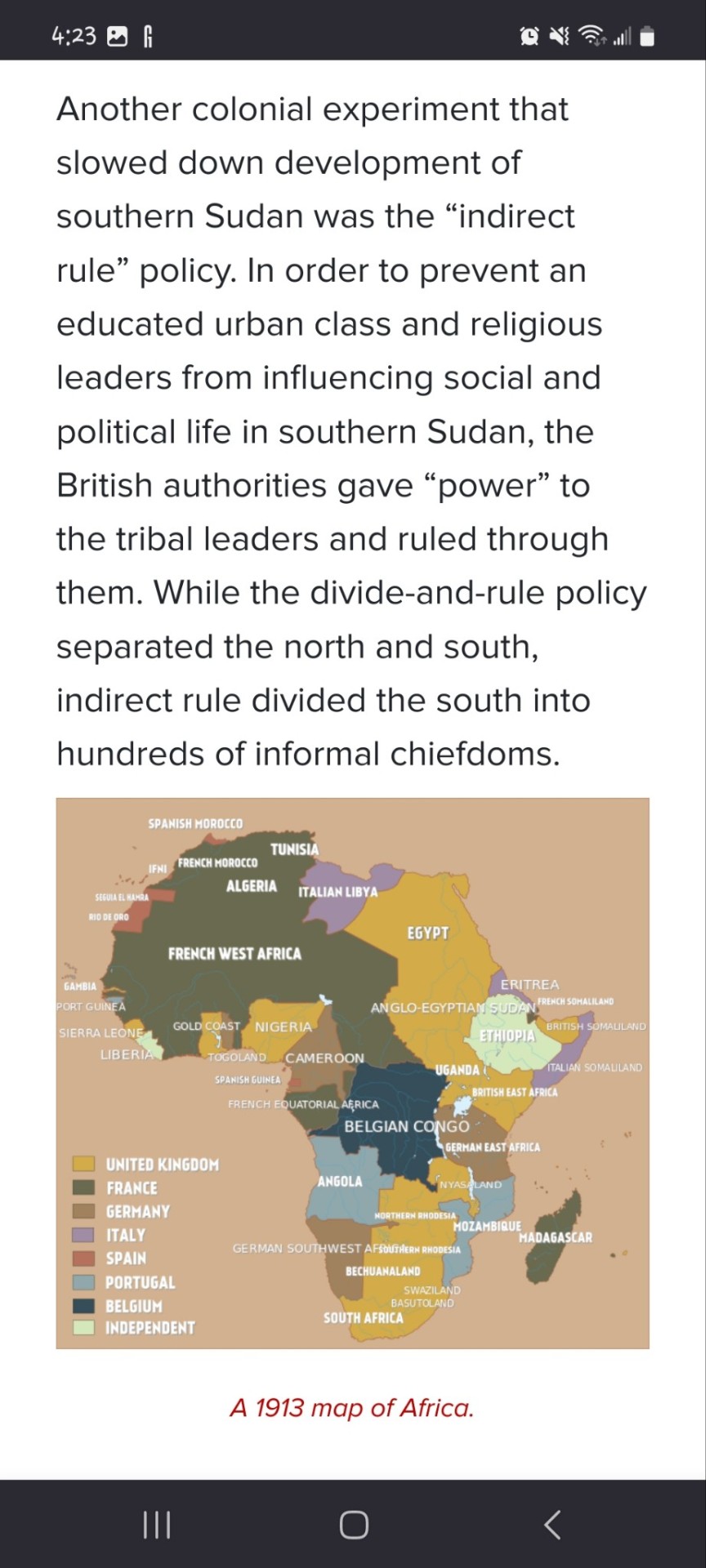
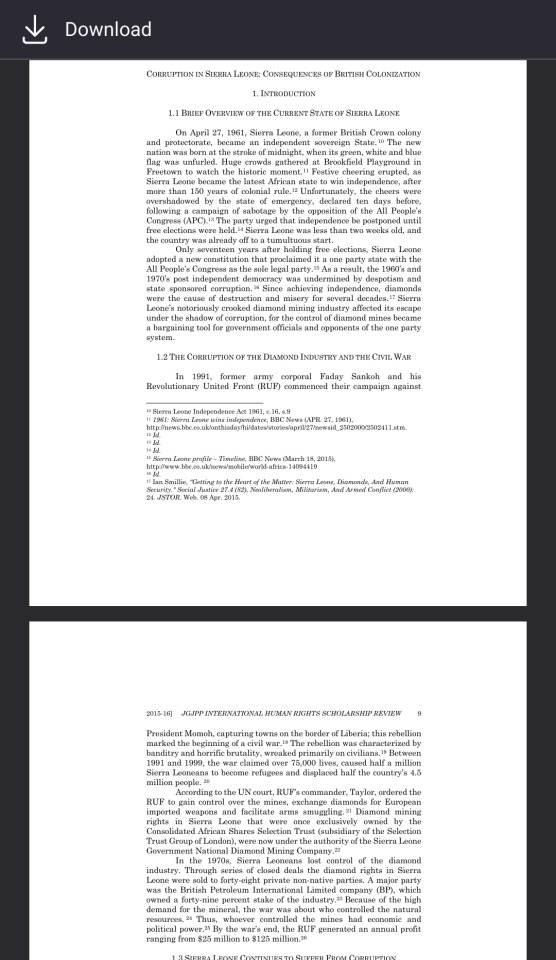
It's almost like the imperialist businesses that feed off African continental resources and were installed during colonization as a form of economic imperialism were often THE ONLY PARTS of the social system left largely functional after withdrawal and "decolonization". It's almost like imperialism and colonization never actually stopped!!! It just??? Changed shape ☆->¤ still a fuckin crime against humanity my guy!!! Especially when child slaves are dying in your mines!!!
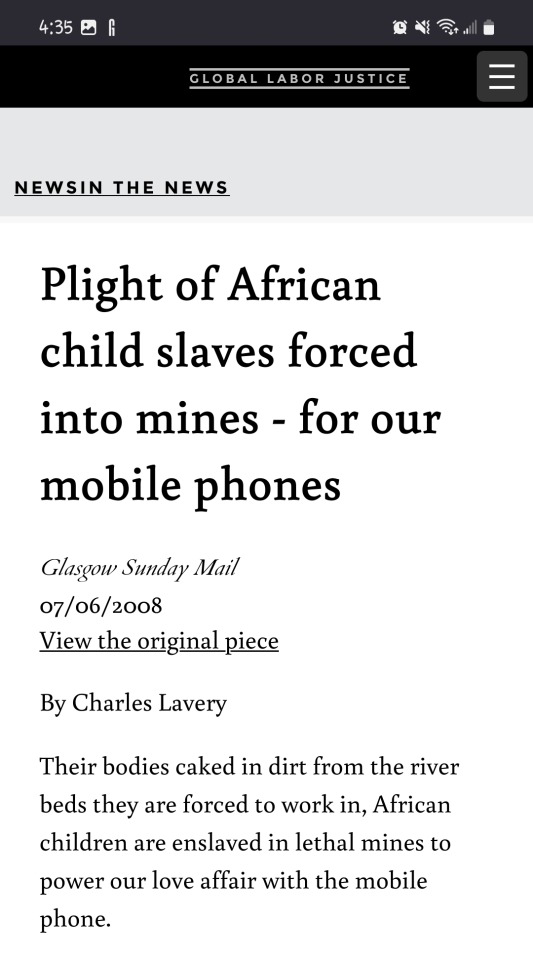
Sudan's economic imperialism comes in the form of Blood Diamonds! You know. The reason that none of us are buying earth mined diamonds anymore when lab made are literally the same goddamn thing RIGHT????????
Oh! They also have oil. The thing we're using to fuel our climate change machine. The climate change machine that's KILLING THEM.
And unfortunately for those of us with Nickel allergies, gold and silver have the same problem. If you haven't already switched to surgical steel, you might wanna. Of course, then we're right back to climate change since steel production allegedly creates a whopping 7% of global emissions due to relying on coke (coal) as a fuel source. So. I dunno really. I like my jewelry as much as anyone. But do I like it enough to know people are dying so I can have it?????
Not really. I'd rather save that risk addition for surgical steel being used in ACTUAL surgeries like the plates, pins, and screws that reattached my foot, or the replacement knee joint that my mom got. At least until we have a body-safe material for these things that ISN'T a source of devastation in the global south.
My point is, basically, that historically militerized conflict almost always stems, at least, in part, from efforts to control resources. It's the most timeless reason to go to war. To make sure you and the people you care about can guarantee themselves access to survival need-meeting. As consumerist and capitalist societies, it is DEEPLY important that we understand the price we ask other people to pay for our luxuries. For our right not to be made uncomfortable by too much radical change too quickly. We need to make that causal link A LOT more visibly explicit and unavoidable, because as it stands, allowing the hierarchy to go unspoken is going to kill billions.
I don't want that on my hands.
I highly recommend learning what civil disobedience and mutual aid infrastructures of care look like. How can we hold corporations (and the individual people who work there) accountable for the countless deaths directly attributable to their profit margins? How can we maximize our local resource distribution to ensure everyone has what they genuinely need to survive, even if that means we take a little less from the community resources for ourselves, or we have to give up things that can't be fully replaced by regionally sustainable alternatives.
I promise that we will adapt.
The dead can't.
77 notes
·
View notes
Text
Thank you @enchantedlandcoffee for tagging me a few days ago to share a snippet, I finally got around to trying to post it. This comes from my still currently untitled BTS/Larry fic.
As Louis continued, “Our management is different from yours. I have seen the discussion of HYBE’s relationship with BTS. Your separation is different from ours. Yours is, unfortunately, government-sanctioned rather than based on contracts. Throughout this next year, I would work to find ways to communicate. How is Korea looking to accommodate its biggest asset? You’re the biggest export from Korea besides Samsung, right?” Jungkook and Namjoon gave a quick laugh at Louis’ last sentence, while Yoongi and Taehyung looked a little confused. Quickly, Namjoon translates Louis’ last question for the others, resulting in a bit of a startled laugh from Taehyung and a light smile from Yoongi. As Louis spoke, the members of BTS understood that Louis was making jokes to ease potential tension. “In our case, we weren’t considered that valuable. Throughout the course of One Direction, we, as the whole band, were constantly told that we were expendable and that One Direction wasn’t unique in being a boyband that broke records or broke into the United States. We were indebted to the label and Simon Cowell for choosing to make a boyband with us, not other individuals from the show.” “We were kids. We didn’t know to be fully aware of what was in our contracts or how our management company and label would market us. Early on, Harry and I became boyfriends during XFactor; there were some whispers that we could potentially be out and open about our relationship. We even did an interview. One that hasn’t seen the light of day, however. But we were much more open, allowing fans to see us interact and being coupley on our social media. This, of course, halted the minute the band’s investment could be moved beyond just the United Kingdom and Ireland. According to them, we had significant potential to expand our band globally. But that also meant conforming to other culture’s rules on sexuality and gender identity. I’m sure you all received similar media training and discussions once your group moved from a solely South Korea operation to a global one.
Let me know what you think, this one is taking a while, but I think I've figured out at least where I want it to go. Tagging @thechavier @louisgayvodka @allwaswell16 @itsnotreal
6 notes
·
View notes
Text
A Queer Book Rec (and my life story because I'm extra)
This post will be long and semi-autobiographical but I ask my friends to please bear with me as I think it will be beneficial.
I have started rereading (as a form of self care to preserve my sanity) the book Real Queer America by trans journalist and author Samantha Allen (who also currently writes for my favorite queer magazine "Them" and received a GLAAD Media award in 2018 for her work, seriously she's a hero of mine and I really hope to meet her in person one day). Real Queer America is a semi-autobiographical work about queer culture in red states and is one of the first books I read when I came out as trans. In its pages, Allen highlights the thriving queer communities that exist in hostile areas, revealing the beauty of queer culture in some of the most draconian states on record. The fact that she spends a large section of the book in Bloomington, Indiana where she met her now wife (who was studying queer porn at the Kinsey Institute at IU honestly how cool must this couple be?!) is a big bonus for my fellow Hoosiers. I've started a tradition of reading this book at least once a year and those closest to me will often hear me refer to it as my queer bible. It has loads of encouragement for f@gs like me who love our little red states and have no intention of leaving.
When I tell other queer friends that despite having spent time in both New York and LA, I choose to live 20 miles south of the house I grew up in, I’m usually met with confusion and shock. I think most people expect me to be in regular danger of being gang SAd by hillbillies in a cornfield somewhere. But the way I see it, the hills and woods and river valleys of Southern Indiana are my home. I was born here and I have just as much right to live here as anyone. Growing up in a stereotypical conservative evangelical household (I frequently heard my father brag that he voted for Reagan twice) with an healthy dash of emotional and physical abuse (my clearest earliest memory is my mother shoving me out of a dining room chair and throttling me on the ground when I was about 6), being anti LGBTQ+ was a given.
My religiously homophobic parents certainly did not ask for a queer kiddo and yet, God has a sense of humor. And so at the age of 11 when I began struggling with my gender and sexuality, I automatically and correctly assumed that I could not go to my parents for help. The things my parents discovered due to my negligence cost me dearly, threats of conversion therapy and military school from my father and more...direct physical consequences from my mother. My secret boyfriend in high school likely still wonders why I broke off communication with him so suddenly. Had he been able to see the blood dripping on my phone screen from my busted lip as my parents stood over me while I typed the message, it likely would've made things more clear.
And for a while, they succeeded in beating the queer out of me. I succumbed to their alt right rhetoric for many years for my own safety and tried to present myself as the clean cut All American Boy they wished me to be. But, like the many members of the RNC, the Grindr app hidden on my phone and the panties and nightgown in the back of my underwear drawer told the real story. Eventually, I couldn't hide anymore and reached the point where I either needed to come out or unalive myself. So I went no contact with my parents, started injecting hormones into my thigh every five days, and became the glorious trans dyke I am today.
Well that’s not entirely true, I was terrified. And proud. Terriproud? Proudified? I didn’t leave the house unless I was decked out in several pride-themed articles of clothing. Every social interaction with the cishet population was down with a determined scowl and my fist half-cocked, waiting for anyone to give me trouble. The energy expended going to the grocery store was exhausting. Then one day, I looked up and saw an entire group of people ready to embrace me, to love me for the first time in my life for who I was. A fellow trans girl I had never met gave me a ride to Indianapolis to speak out against the anti trans laws coming down the pipe. I got a job at a theatre where there was one cishet person (we called him our diversity hire). I was amazed. There is truly nothing more wonderful on all the earth than queer community. Never before have I seen a group more thoroughly and solidly perform Christ's command to love one another. I found here in southern and central Indiana some beautiful people who help each other get through this ridiculously difficult life, indeed who DO LIFE together, who truly LIVE together. It was amazing!
Even more fascinating to me was beginning to read LGBTQ+ history and finding out it has pretty much always been this way! Through the decades of living in the shadows of history, to the gay liberation movement and Stonewall, through all of it, different outside groups have come and gone. Various religious groups have embraced and rejected LGBTQ+ people, many political candidates have made hollow promises or delivered only half of what they said they would, many people let us down. But we've always had each other.
If you've read my ramblings this far, thank you. And I'd like to get to my point now. We will never have it easy. By definition of being queer, we will always exist outside the norm. And those who want everyone to fall in line will use every tool at their disposal to make that happen. Religious rhetoric. Rule of law. Political grandstanding. Even physical violence. Why? Because they're afraid of us. Having spent years around alt right men, one thing they're fond of saying is "I'm not homophobic cuz I'm not afraid of f@ggots." Bullshit. They're terrified of us. And that’s badass.
So in this time of uncertainty, I want to encourage all of my queer friends all over the US to band together, put pet political idealism aside, and unite for the safety of all of our siblings. 2024 isn't the end of us. It isn't the end of our fight. Scarier people than Trump will rise. Our rights may be taken away. We may indeed go back to the 50s or (God save us) 1939 Germany. But our queer fore-parents lived through those times, and they didn't let that stop them. They forged and hacked out spaces for themselves, they picked a spot, planted themselves in it and DEMANDED to be recognized for who they were. And when those who hated them came and tried to remove them by force, they banded together and fought with bricks and handbags and lunch trays and high heeled shoes. When the first Stonewall riot broke out, Sylvia Rivera, that trans foremother who was dubbed the Rosa Parks of the transgender liberation movement, was told by a friend to stay inside, she responded “I’m not missing a minute of this! It’s the revolution!” Let us carry her spirit with us as we move forward, whatever happens in November. We will always have each other. We will always be here, we will always be queer, whether people get used to it or not.
#queer christian#trans christian#faithfullylgbtq#gay christian#trans#lgbtq christian#lgbtq community#queer community#queer history#lgbtq books#lgbtq authors#lgbtq history#thisglassdarkly
3 notes
·
View notes
Note
Oh right the pan African movement…my middle name is a result of that…anyways
Problem because I lived in the Midwest, then the south, and back to the Midwest. Of course there are lot of overlap. But I wonder how many black people up north knows our people still live in the country?
But as you mention with the nyc boroughs,
If we Americans goes “Savages savages, barely even human!” To a state right next to each other
What the hell you guys expect from Africans?
Also Hurston mention that red rope myth…actually I watching a YouTuber Blair white podcast where she made a comment towards a member of the view show is that does she think life is a Disney movie.
This got me thinking and slowly realize that Africans Americans even into middle age maintain the sanitized version of the slave trades we were told
And we never updated in middle school, seriously I didn’t know about the Africans selling other Africans things until I was a teen on tumblr
Just curious….especially since the left been in control of education for decades-oh wait they scared shitless the racism of 1st and 2nd wave feminism and the damage they did with the sex revolution
Look I’m not a purist…let just a lot of shit my community and other poor ones went through make sense
(Also why my people suspiciously make up 50% of abortions but that another story)
And African nations want reparations? Hmm here what I would probably go like in a un meeting
“Now while slavery is a big stain on human history, the Americas and Europeans countries who participated in the Atlantic slave trade acknowledge it was terrible and made sure to end it. While giving reparations to slaves if they can. But beyond that, the Africans nations who were part of slave owning kingdoms such as the Dahomey will not get refunds…wait, you guys think we wouldn’t eventually find out the truth? After the women king film, the False Eden of Africa you exploited many Americans of slave dispora from don’t work anymore.”
Also like if I ever go to Africa, I’m not trying to spiritually to connect there. I’m genetically mostly Yoruba, but I’m culturally Anglo-Saxon. I’m just want to do research, where my ancestors were from, the environments, the kingdoms and empires they lived in.
But unless I’m married someone from a Yoruba tribe, I’m at the end of day an American. I think my community haven’t come to the realization even when interacting with African immigrants
Problem because I lived in the Midwest, then the south, and back to the Midwest. Of course there are lot of overlap. But I wonder how many black people up north knows our people still live in the country?
I imagine you'll get some of the city folk that will picture them in a very Uncle Remus/Song of the South way, not the whole racist bit so much as just the same way you'd picture the white yokels like Cletus and Brandine on the Simpsons, not racism there just classism.
This got me thinking and slowly realize that Africans Americans even into middle age maintain the sanitized version of the slave trades we were told And we never updated in middle school, seriously I didn’t know about the Africans selling other Africans things until I was a teen on tumblr
I still don't even know how that all got started, if you stop and think about it logically obviously there's going to be people in Africa working with the slave traders, the ruling group wants to remain the ruling group so when someone shows up with boomsticks that make all that being the ruling group even easier they'll take them up on it.
Native Americans were big on that too, territorial expansion and slaughtering and subjugation of your foes is a universal constant in the human species, several species in the rest of the animal kingdom too.
(Also why my people suspiciously make up 50% of abortions but that another story)
Negro Project
They look to be attempting to rehabilitate Margret Sanger in various publications and what not, but the simple fact of the matter is that planned parenthood was founded, in part, to control the black population. Now was it a we don't want any more black children born or was it gotta see if we can help them out of poverty and having 12 kids is not going to make that goal any easier or any other reason the founding of the group had the control of the black population in mind.
They haven't moved away from that really.
And African nations want reparations? Hmm here what I would probably go like in a un meeting “Now while slavery is a big stain on human history, the Americas and Europeans countries who participated in the Atlantic slave trade acknowledge it was terrible and made sure to end it. While giving reparations to slaves if they can. But beyond that, the Africans nations who were part of slave owning kingdoms such as the Dahomey will not get refunds…wait, you guys think we wouldn’t eventually find out the truth? After the women king film, the False Eden of Africa you exploited many Americans of slave dispora from don’t work anymore.”
There's some African countries that have actually apologized for their role in the slave trade, Libya being one of them gaddafi before all that "fun" went down there during the arab spring had done it,

no that it solved anything, Slavery in Mauritania is still a big issue,
In 1981, Mauritania became the last country in the world to officially abolish slavery, when a presidential decree abolished the practice. However, no criminal laws were passed to enforce the ban. In 2007, under international pressure, the government passed a law allowing slaveholders to be prosecuted.
2007, but you know whippo bad or something.
Also like if I ever go to Africa, I’m not trying to spiritually to connect there. I’m genetically mostly Yoruba, but I’m culturally Anglo-Saxon. I’m just want to do research, where my ancestors were from, the environments, the kingdoms and empires they lived in. But unless I’m married someone from a Yoruba tribe, I’m at the end of day an American. I think my community haven’t come to the realization even when interacting with African immigrants
Ya I'd like to see the place where my DNA is from some day, get some drinks and some food and a couple shirts and a coffee mug, end of the day I'm still a purebred American Mutt though, can trace bits of the family tree back to when there was only one Virginia and it was a colony, some pre civil war stuff in Florida too.
Besides, I'm red green colourblind what am I going to do in Ireland besides be handicapped, lol.
6 notes
·
View notes
Text
Introduction: Fashion and Globalization
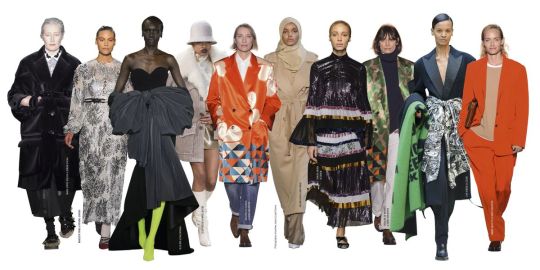
Throughout time, humanity has changed and adapted as a response to all things big and small; The significance of dress to humans means fashion follows. While it's impossible to determine all of the influences fashion has been shaped by throughout its history, it's clear that culture is the most recognizable and influential. Enter globalization; a concept that both unifies and divides culturally, but how is that possible?
Consider the two opposing views on globalization
Globalization is important in understanding people of different cultures through exposure allowing for “better understanding of foreign values and attitudes. Less stereotyping and fewer misconceptions about other people and cultures”("Globalization Pros and Cons") Still, the loss and exploitation of cultures around us and power imbalance among nations is undeniably a problem due to globalization. ”The loss of traditions associated with globalization is cultural imperialism. For example, the Maasai, an ethnic group in East Africa, are historically pastoral and semi-nomadic. Throughout the past century, many Maasai have transitioned to farming or other occupations besides their traditional lifestyle.”(Garbuio) Perhaps we should aim to find a middle ground; to share cultures worldwide but with emphasis on respect towards the separate origins of the practices, art, and characteristics being shared. This means respecting the sacristy of certain practices towards a culture and knowing when and if participation would be respectful.
Globalization and Cultural Authentication
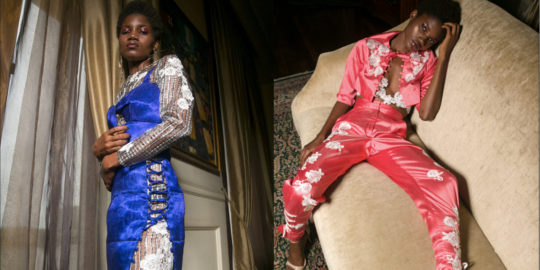
With an understanding in mind of globalization and its effects on culture comes the question of its relation to cultural authentication. While it’s arguable cultural authentication promotes globalization, a bigger case can be made for globalization’s prompting of cultural authentication. As we globalize, our lines of communication grow faster and more efficiently, allowing contact between people of cultures who wouldn’t have been able to interact with one another prior. “As more cultures have cross-cultural contact, people begin to change aspects of their cultures by incorporating aspects of different cultures they come into contact with.”(Elder). An example of this is globalization through immigration and economics between China and Africa. “As the Chinese population in Africa continues to increase along with China’s large economic involvement in Africa’s economy, local African dress styles are absorbing elements of Chinese culture to produce a novel and individualistic Sino-African look”(Liu).
Studying Globalized fashion
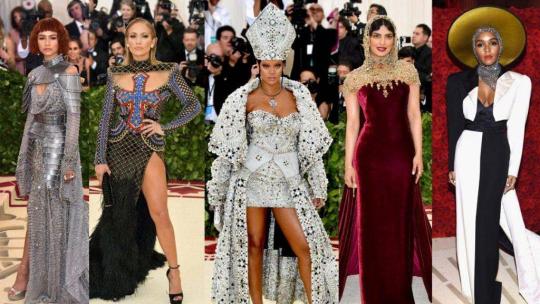
Knowing the advantages and disadvantages of globalization culturally, we can see advantages and setbacks of studying fashion through a global lens. There's benefit in studying cultural fashion on a global scale; it allows a better understanding of our textile, silhouette origins, and pattern usage in conjunction with culture. If respected, diversity can be incorporated into fashion, concerns arise when little care is taken to credit the origins. “The ministry said the companies had taken inspiration from designs created in the south-western state of Oaxaca and called for benefits to be awarded to the communities behind them.”(Marriott). There’s incredible beauty in sharing our ways of life with each other, but we can’t lose sight of the history and significance of our original cultures. Through acknowledgment we find respect, and it is through respect that humanity may continue to grow.
Sources Cited
Elder, Abbey K., et al. “Culture.” Dress Appearance and Diversity in US Society, 1 Aug. 2020, iastate.pressbooks.pub/dressappearancediversity/chapter/culture/#:~:text=As%20more%20cultures%20have%20cross,referred%20to%20as%20cultural%20authentication.
Garbuio, Caleb, and Ella Adams. “Opinion: Big Business Is Killing Cultures.” The Appalachian, 12 Feb. 2021, theappalachianonline.com/opinion-big-business-is-killing-cultures/#:~:text=The%20loss%20of%20traditions%20associated,occupations%20besides%20their%20traditional%20lifestyle.
“Globalization Pros and Cons: Economic, Cultural, Political.” Netivist.Org, netivist.org/debate/globalization-pros-and-cons-economic-cultural-and-political. Accessed 5 June 2023.
Liu, Si Ting (Jess). “The Authentication of Chinese Culture in African Fashion.” Fashion History Timeline, 16 July 2021, fashionhistory.fitnyc.edu/chinese-culture-in-african-fashion/.
Marriott, Hannah. “Mexico Accuses Zara and Anthropologie of Cultural Appropriation.” The Guardian, 1 June 2021, www.theguardian.com/fashion/2021/jun/01/mexico-accuses-zara-and-anthropologie-of-cultural-appropriation.
2 notes
·
View notes
Note
I'm the anon that sent you the message about hating the term PoC. Yeah, I pretty much agreee with everything you say. I don't believe much in POC solidarity because our struggles are very different between each other, and trying to paint everything as us vs whites does not really work. Perhaps for americans it does, since they have a very diverse population, but it's more difficult when talking about other countries.
Like latin americans do not have the best relationships between each other, they might share language but have very different cultures. Like the other day I was reading about this cartoon named "Oye primos" that was going to premiere and it was made by a second gen latina, where she looked to represent her growing up in a latin community in the USA, but she was clowned by pretty much every latino leaving outside of America. First, because the name of the cartoon is gramatically wrong (it should be "OIGAN primos, not OYE primos), second, because she used the word "LATINX", which latinos hate, and third, because she named the town the characters live in "Terremoto (Earthquake) Heights" or something like that (people though it was offensive because Mexico and Chile have suffered through a lot of earthquakes). And there's other stuff, like people saying the animation is ugly (very calart) and so on. Some people even started praising Los Casagrande, a spin off of The Loud House with a main mexican family thats not even made by latinos, but its considered far superior.
Sorry, I got a little carried away with that, what I wanted to say it's that its pretty common for latinos to kinda tear each other up, but they unite if they want to clown a "gringo" or something (and yes, they pointed out that the author basically being a 2nd gen makes her a gringa... I guess). Plus a lot of latinos dont like anything that looks "woke", and they considered that show does, so it was doomed from the start. The creator of the show felt pretty overwhelmed by the negative reception, received a lot of backlash and it apparently affected her a lot. I feel pretty bad for her actually.
And yeah, argentinians are actually pretty white, not only because a lot of italians and germans migrated there (if you ever read the names of their national soccer team, you'll notice many names are of italian origin), but because they're at the very south. Chile is also pretty white. But yeah, argentinians have always been pinned as being pretty arrogant and full of themselves, so it doesnt surprise me that they feel they're superior because their team is white. I remember that argentinians and fans of Messi in general were clowning Mbappe for allegedly being in a relationship with a transwoman, so they invented some pretty homophobic chants... soccer fans be like that
Ugh, this got so long,... I was gonna mention asians and their own issues too, but i think it's enough. I did wanted to ask you something though: is France a racist country?? How has your experience being impacted by being black?
Don't be sorry anon, I love these loooong asks where I get to know more my followers 🧡
It's pretty ironic you're talking about Asians because in one of my post where I'm talking about White conservative weaponizing minorities against each other somehow triggered A LOT of people. I even got a comment saying "put the reblogs back I have to give my perspective as someone with Asian/japanese ancestry" and I got like..... "Hm no?" LMAO This girl REALLY thought her opinion was remotely relevant when this was my perspective as Black person and I am not interested about some random Asian take on that issue. Sis really thought my post was a diss against Asians success (I mean every single person who interacted with that post had a negative IQ and entirely missed the post that's why I muted the reblogs) and got like "the cOnsErVatiVes aRe jUst acKnoLedgiNg oUr sUcCesS uwu"...... There's no wonder East Asians are looked down as White people's cucks 💀 IDK, if my community was being weaponized by racist scrotes to dogpile on other I wouldn't go uwuwhy do you mean?uwu about it. How can people have so little self awareness? ...That's why I don't believe in POC and that some communities will actually be more than willing this silence us. Sis really tried to all lives matter my take and I have no patience for that.
And soccer is brain disease tbh. Case in point : the racist Argentinians players dragging Mbappé... Which is a shame bc Messi and him seem to be very cool. Fans are the worst. I think I realized how racist these people were when they said ANTOINE GRIEZMANN (France NT player) wasn't White enough just because his mom was...... Portuguese (when his dad is German)💀

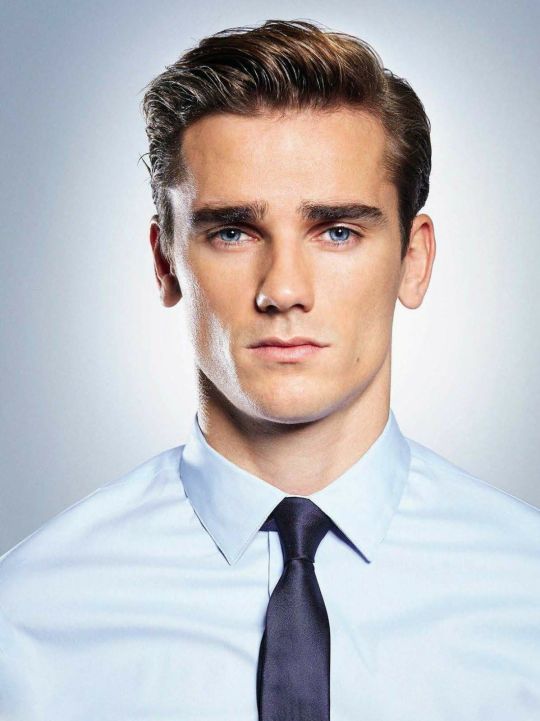
Imagine thinking this man is not White enough when them Argentians be looking like tragic mulattos themselves 💀💀 HE'S LITERALLY THE ARYAN PROTOTYPE 💀💀his name is ANTOINE. THAT'S THE WHITEST FRENCHIEST NAME EVER!! NEVER IN MY LIFE DID I MEET SOMEONE CALLED ANTOINE THAT WASN'T WHIIIIITE 💀💀💀💀
Argentinians living up their nazi heritage ; Portugal ain't white enough lmao...
What's funny with Latins is that they have this thinly veiled superiority complex with Black people.....but highkey are envious of the cultural impact of Black culture worldwide. Latin culture has a load of influence on music, but its impact is not as multifaceted as Black culture (beside music, fashion, hairstyles, make up, slang, etc.). I saw some Latins seethe about Black Panther and the hype the Black community was having from this movie, and Black twitter, in its usual shadiness got like "hmmm don't you have Rio? 🤔" LMAOOOO (it was before Encanto though)
And is France racist? hm... I mean, it's a European country 🥴🥴 but it's definitely one of the least racist one for sure. Non french netizens will do the most about how islamophobic France is, but Islam isn't a race so the problem our country has with Islam isn't much related to race. Because of colonization, France has many territories oversea where its natives are Black, so France is inherently already multiracial, and that's something that many French people acknowledge. I feel like french are more worried about culture than race (ln many aspects, I, as a Christian Black woman, have to bear much less prejudice than a Muslim male, for example). That's why our country is very defensive against Islam (which comes with a whole cultural set) rather than race.
We consider assimilation as a staple and reject self IDing communities (whether they might be sexual, racial, religious). Any stats trying to quantity race, religion or sexuality are ILLEGAL, here. That's why when I see foreign rightoids be like "France is already 25% Muslim!! #greatreplacement" I just know they are full of shit, because such stats are technically illegal...
To give you an example, France leader of the far-FAR right is a Jew...(Eric Zemmour) and a significant amount of people from North Africa/muslim are in the (far) right too.. (many of them change their names to make them sound more french/less Arab such as Jean Messiha lmao)
France itself is a mixed nation between Romans invader and Galicians (basically France indigenous) also some viking mingling in the north(?) That's why french people can be very phenotypically diverse. If you look Griezman (France North type) and Kenji Girac (Southern France type - he's also a gypsy) who are both White french while looking quite different.
Unfortunately nationalism is on the rise, there's an actual revival of neo Nazi (which is hilarious bc France has been invaded/defeated by Nazi and that actual self respecting French rightoids hate Nazism because of that 💀) so I feel like France is getting less sale for foreigners/non Whites. I think France is the best place to live in Europe if you're afraid of racism but yeah, it's getting quite heated here....
1 note
·
View note
Text
New Digital Architectuul Fellows: DAF
Learning, Interacting and Networking in Architecture, shortly LINA, is a new European architectural platform coordinated by the Faculty of architecture in Ljubljana. A network connecting prominent cultural institutions with emerging practitioners steers the architectural profession towards sustainable, circular and clean practices with highlighting emerging voices. The LINA Architecture Programme is carried out by different architectural museums, universities, research networks, foundations, triennials, biennials, and other European and Mediterranean architectural organizations. It was born from the Future Architecture platform, created by the Slovenian architect, critic and curator Matevž Čelik.

Under the umbrella of LINA Architectuul will give the opportunity to several fellows under the programme Digital Research Fellowship to join the collaborative online architecture publication and work with Architectuul’s editorial team. I had the opportunity to talk with Architectuul’s Digital Research Fellows 2023 Tevi Allan Mensah, Meriem Chabani (New South), Laura Solsona and Eduard Fernandez (self-office).

What is your current focus in architecture?
Allan Mensah: Architecture has changed and it can’t be the same discipline as it has been for decades. We need to understand that architecture doesn’t necessarily mean to build, it can also be a discipline of communication and research. In such a way one of my main focuses is to research how architecture can become a means of communication.
Eduard Fernandez: I believe that an architect nowadays cannot do only one specific thing, and that thing cannot be just building. Bringing in other topics could help the architecture discipline to go further with its role within society, especially to open new conversations in other specific fields. In this sense, it is crucial to demand our public institutions to invest in research and culture through financing and new policies in construction, so this is the way new narratives and approaches can be explored. Our office is, in this sense, multidisciplinary: we enter competitions, we have a few private commissions, but we also do research and teaching.
Meriem Chabani: I prioritize vulnerable bodies and territories following the words of bell hooks by putting the margin at the center. I enjoy questioning power dynamics and stakeholder relations, looking for that space of freedom in-between, where my projects explore human practices to inform spatial resolution. In order to tackle the climate crisis, I also deeply believe in a decolonial approach centering overlooked knowledge, practices and bodies from the Global South.
How is your proposal for LINA dealing with such issues?
Allan Mensah: My visual research Borderlands has an idea how the border can be a territory of possibility and of opportunity for architecture. In such a way I can propose ideas to change the way people are perceiving different kinds of territories. Being an architect means creating borders every day with every line that you draw. Therefore I started to cut the word “border” in different synonyms, which creates different positions in architecture. In such a way borders can be displacement, thresholds, it can be an invisible, virtual border, a territory of heterotopy, it can also be a synonym of an island.

Island, project for a moving refuge. | Photo © Tevi Allan Mensah
Meriem Chabani: The research Sacred Grounds is a call for cities to reinvest in the notion of the sacred, bringing about processes of care for the built environment. In secular societies, the sacred has all but disappeared from the urban realm. The buildings that embody sacredness - churches, mosques, and other places of worship - are increasingly removed from the city’s landscape, and stand, for the most part, empty. Elsewhere, monuments offer a rigid approach to collective meaning and memory - often shaped by political agendas - but overall, the urban realm in Western cities holds little space for that which cannot be defiled. In a nutshell, Sacred Grounds is about the restoration of a sacred covenant between people and place, to establish a framework for the creation of value outside of market price, fostering truly sustainable cities.
Could the notion of the “un-defileable” hold a vital significance in the age of climate emergency?
Meriem Chabani: An example can be found in the Algerian desert town of Ghardaia. Built on a hill, Ghardaia is an oasis town of brick and packed earth houses overlooking the Sahara. At its base, a few acres of palm trees grow, while at the top, a single palm tree stands across the mosque. For miles, the trees below and the tree above are the only patches of green visible. A few decades ago, the townspeople decided to expand the city outside of its historical walls and build new houses by cutting down the palm grove. In 2008, heavy rainfall resulted in a flood that destroyed hundreds of homes and killed thirty people. The neighboring town of Beni Isguen, which had preserved the trees growing on its border, was not affected. As a result, in Ghardaia and surrounding towns, the fundamental importance of the palm tree has been re-established. As Muslims, the inhabitants do not worship idols - to them, there is no god but God. Yet the palm trees, if they are not holy, are definitely sacred.

First prototype built at CIVA (Brussels) in summer 2022. | Photo © NEW SOUTH
The story of Ghardaia teaches another lesson: to build a sanctuary isn’t to separate it from the urban landscape; it is simply a way to define, collectively, a priority that is absolute. From this perspective, sacredness could be an economic principle: by design, the sacred is what lies outside of the reach of human exchanges. If translated into the language of contemporary architecture, the sacred is outside of the grasp of unchecked real estate development.
How did participation in LINA influence your work?
Laura Solsona: When Eduard and I moved back from Australia, where we worked for four years, we applied to LINA with the aim of establishing a network of people with similar interest in the European context. We believe LINA can offer us the opportunity to get involved in contemporary research projects and collaborate with peer architects from different disciplines. The research project Infrastructures of Resistance with use for the application to the LINA open call was produced in 2021 at the University of Technology Sydney. As tutors we did a design studio that investigated alternative forms of ownership to collective housing. Now the next step is to keep developing the project in other European contexts.

Project of the student Boris Mandić from Infrastructures of Resistance studio, University of Technology Sydney. | Photo © self-office
What do you expect from LINA?
Allan Mensah: Well, to be showcased on a European scale is for me a big opportunity because it offers me new connections and the possibility of creating my own network. LINA also changed the format of my research by understanding and learning from involved institutions' needs. It offers me new ways of learning especially with new tools, like being a digital fellow of Architectuul will help to understand and work in digital publishing. Digital publishing via Architectural is a territory of freedom that is completely new to me and I am really excited about learning brand new tools.
Where did you hear about LINA?
Eduard Fernandez: I heard about LINA via e-flux magazine because I’m subscribed to the newsletter. I knew its predecessor, the Future Architecture platform, which I just found out it was formed by most of the same members, which is great. I hope that LINA keeps pushing young architects, editors, organizations, schools of architecture, museums, biennials and triennials to create alternative narratives and a new critical body of work.
What shall the architecture profession become/change in the future?
Allan Mensah: Architecture needs to be able to adapt to another position. As a profession it needs to be more honest and not try only to reproduce answers. In times of complete uncertainty we can’t be in the position that we know everything and we are able to solve all problems because we won’t change the world alone. My idea of the change is not in the way we work, organize, construct, but more the way we are.

Island, project for a moving refuge. | Photo © Tevi Allan Mensah
Laura Solsona: We believe that the figure of the architect that knows about everything and works alone does not exist anymore. An architect is a professional who can establish strategies and is able to coordinate the work in between disciplines. It combines different narratives and goals that take into consideration the limited resources, both material and economic, in each case scenario. Moreover, it is crucial to reframe education of architecture in universities. Shifting towards an educational model that puts the focus on collaboration rather than competition could start changing the attitude towards design and building.
Meriem Chabani: The architecture profession is likely to undergo significant changes in the future, mainly driven by the climate emergency, and shifts in societal needs and values. According to data from the International Energy Agency (IEA), the construction sector is responsible for approximately 36% of total energy-related carbon dioxide (CO2) emissions globally. Architects are, and will continue to be expected to design buildings that are more energy-efficient, environmentally friendly, and resilient. However, some argue for a more fundamental change, with Charlotte Malterre-Barthes defending a moratorium on new construction (2021). In industrial countries, tomorrow’s cities will mostly be today’s cities, with already densely built urban fabrics. Our industry might be wise to anticipate a shift towards greater care for what is already built, transforming, re-using and expanding on what is already there.

A pavilion calling for cities to reinvest in the notion of the sacred, bringing about processes of care for the built environment. | Photo © New South
Care in which sense?
Meriem Chabani: The standard body for which we design will hopefully also come into question. With increasingly aging populations in Europe and industrialized countries, how we accommodate the needs and care necessary for these bodies will become an essential driver of public policies. Overall, I think these changes are to be celebrated: let’s bring more care into architecture, more diversity both in how and for whom we design.
How hard is it to survive with architecture on today’s market?
Eduard Fernandez: As architects, we have been educated to provide a service to society based on economic growth. What we have learned recently after the Global Financial Crisis, and even Covid-19, is that we do not need new museums, hospitals, housing developments, etc. but rather a more specific approach towards the way we reuse what we have already built and a more sustainable way of living. All this is directly related to architecture, so there needs to be a market shift in this direction. Also, we do not need to build that fast as we have been doing in the last decades. Nowadays, the situation of our society is based on precarity (energy, housing, etc.) so we need to find alternatives to that situation.

Project of the student Boris Mandić from Infrastructures of Resistance studio, University of Technology Sydney. | Photo © self-office
In our office, we want to change the way we think and explain our projects, as we have been taught. New narratives that take into consideration sustainable construction methods, the reuse and recycle of materials and the circular economy. It is hard to survive economically when one has this ambition because it is time consuming, but that is our ambition.
Meriem Chabani: Obviously, this varies depending on the context, but if we’re talking about the construction market, we’re really talking about value. And in this equation, architects find themselves in unfavorable power dynamics. Mainly, what I see everyday are the following difficulties: a profit-driven construction market, with a growing private sector and ever-disappearing public sector; the increasing complexity of the construction process has given way to a specialization of expertise, and an increasing division of the fees associated with it, with small and young architecture practices struggling to keep up and restricted competitions that favor older practices and exclude younger or more innovative approaches.
Faced with an uneven playing field, I strongly believe that we cannot simply play by the rules. We need to understand the rules, the other players and their endgames. Then hack the game, disrupt it, play within and across it, shamelessly. Overall, the architecture industry is constantly evolving, and surviving in it requires a combination of technical expertise, creativity, business savvy, and grit.

Digital Architectuul Fellows 2023: Tevi Allan Mensah, Meriem Chabani (New South), Laura Solsona and Eduard Fernandez (self-office).
2 notes
·
View notes
Text
Unlocking the world with a Spoken English Course: The Road to Fluency
Why Spoken English is Important Real-time expressions in natural fluency in English in everyday life rather than just a dictionary of words and rules. Whether for exchanging business ideas, attending an international conference, or even chatting with friends from other parts of the world, fluently talking in English will open multiple doors to countless opportunities.
While most have a great conceptual understanding of how to write in English, speaking is often the more daunting task. A Spoken English Course is designed for the eventual overcoming of this barrier that will transform you into becoming the most confident and fluent speaker; with little effort, you'll navigate any conversation easily enough.
What Does a Spoken English Course Offer? An all-rounded Spoken English course will train you in every area you need to master in order to be able to speak naturally and confidently. Here's what you can look forward to from a structured course like this:.
Conversational Practice: You will find that interaction in all forms is crucial for improving your speaking ability. Group discussions in spoken English courses often include discussions, role plays, and real-life simulations of many casual settings. Practising'real-life' situations, such as ordering at a restaurant or being interviewed for a job, gives you experience in everyday life situations.
Pronunciation and Accent: One of the most difficult areas in speaking English is pronunciation and neutralizing all sorts of accents that may interfere with clarity in communication. A Spoken English course will guide you on how to improve your pronunciation so that speech is clearly understandable by a native and non-native speaker alike.
Listening and Comprehension Skills: Communication is not always talking but the art of listening as well. Spoken English courses emphasize effective learning of listening, grasping different accents, tones, and speech. In this manner, you would be able to converse with a person who is situated anywhere in the world, say in Japan, China, and South Africa, without feeling lost.
Building up Confidence: Communication in a new language is scary, but of course, confidence is the key to fluency. The Spoken English course gives you a platform to be in a familiar space where you can practice without all fear and judgment. Gradually, you will find yourself more confident to express your thoughts, opinions, and ideas in English.
Grammar in Context: Instead of breaking grammar rules into fragments, the Spoken English course breaks up grammar rules as it weaves them into something practical and conversational. You will pick tenses, sentence structures, and phrases without overthinking the technicalities in actual conversations.
The Power of Fluency Imagine being able to express your ideas fluently when there's a business presentation or easily conversing with colleagues in other countries or friends from other parts of the globe. Fluent English would open your world to experiencing the following:.
Expand Career Opportunities: Many companies, small-scale and giant multinationals, make it an issue to employ effective communication skills in English. Wether you want a promotion in your first job, change to a global company, or seek to be abroad to get a broader horizon of opportunities, then spoken English will boost up your career significantly.
Travel with Ease: English is spoken in over 100 countries. Essentially, it's a necessary adaptation for the traveler. Strong English-speaking skills help you explore cultures, navigate new cities, and interact with locals without worrying about a language barrier.
Build global connections. With our world going more digital, friendships, collaborations, and communities could be all over the globe. Proficiency in the English language opens doors for any kind of opportunity or connection one desires to have because it enables a person to connect with people anywhere in the world to contribute to global discussions and share ideas in international forums.
Learning tailored to every level Whether a beginner or someone who is already an accomplished English speaker, you can always find a level of spoken English courses that cater best to your needs. Each course sets levels that range from basic to advanced, which ensures each learner progresses at his own pace.
For anyone with a busy agenda, it is an online course in spoken English that can be pursued from the comfort of one's own time. With interactive lessons, virtual practice sessions, and personalized feedback from experienced instructors, you can refine your speaking skills from home.
A Lifelong Skill Most important, learning to speak in any language richly continues to aid you in every way, in all walks of life. Therefore, it enhances your social life, assists in professional growth, and gives you confidence in every aspect of your life.
Get Confidence and Start Speaking The bottom line is: a spoken English course is your ticket to the world. Whether it's enhancing one's career, traveling confidently, or speaking correctly in day-to-day conversations, mastering spoken English offers you the tools and capability to prosper in this interlinked world. Don't let the language barriers hold you back. Just follow the journey, practice consistently, and soon you will be speaking fluent, confidence-filled, effortlessness-laden English. The world awaits—start speaking today!
0 notes
Text

Join the Jahva Tribe: Your Gateway to Global Rhythms
Welcome to the Jahva Tribe! If you're looking to immerse yourself in a vibrant world where music transcends borders and genres, you've landed in the right place. Here at Jahva Tribe, we blend deep house with electro and the pulsating rhythms of Amapiano, creating a soundscape that captures the essence of urban culture and beats. Originating from the lively streets of New York, Jahva Music has quickly evolved into a global phenomenon, and we want you to be a part of it!
Discover the Beat of Jahva Music
At Jahva Tribe, we believe that music is more than just sound; it's a universal language that connects us all. Our community is dedicated to those who feel the same pulse of excitement when they hear the first notes of a new track. As a member of Jahva Tribe, you'll have exclusive access to the latest hits, updates on renowned DJs, and invitations to electrifying live events and retreats that span the globe from Ibiza to Miami, London to LA, and even the sunny beaches of the Caribbean and the heart of South Africa, the birthplace of Amapiano.
Challenges in the Music Community
Despite the thrill of music, many enthusiasts face challenges in their journey. Here are some common issues:
1. Finding Like-Minded Souls: It can be tough to connect with fellow music lovers who share your passion.
2. Access to New Music: With countless platforms available, discovering fresh tracks and emerging artists can feel overwhelming.
3. Missing Out on Events: Staying updated on local and global events is often a struggle, leading to missed opportunities to experience music live.
4. Lack of Support: Many music lovers wish they had a supportive community to share their experiences, dance videos, and favorite playlists.
How Jahva Tribe Can Help
This is where the Jahva Tribe comes in. We are more than just a Facebook group; we are a vibrant community built on a shared love for music and connection. Here’s how we address the challenges you face:
1. Connect with the Community: Jahva Tribe offers a platform for you to meet and interact with other music enthusiasts. Share your love for Jahva Music and forge friendships that span the globe.
2. Stay Ahead of the Curve: As a member of Jahva Tribe, you will receive exclusive updates on the hottest tracks and emerging artists. Our community keeps you informed, ensuring you never miss out on the latest music.
3. Event Updates: Get the inside scoop on upcoming events, immersive live sessions, and retreats. Jahva Tribe will be your go-to source for all things music, keeping you connected to the beats that move you.
4. Share Your Passion: Jahva Tribe encourages you to showcase your dance videos, share your favorite music links, and tell your unique stories. This is your space to shine and celebrate the rhythm of life with others who understand your passion.
Why Join Jahva Tribe?
Joining Jahva Tribe means becoming part of something bigger than yourself. Here are some compelling benefits of being a member:
- Exclusive Playlists: Enjoy specially curated playlists that reflect the heart and soul of Jahva Music.
- Networking Opportunities: Connect with artists, DJs, and fellow music lovers who can inspire and support your musical journey.
- Inspiration and Growth: Engage with diverse experiences that expand your understanding of music, culture, and community.
- Global Events: Be part of unforgettable gatherings that celebrate the unity and joy that music brings.
The Power of Music
At Jahva Tribe, we celebrate the incredible power of music to inspire and connect. We believe that every beat has a story, and together, we can create a narrative that spans continents. Whether you’re dancing in your living room or grooving at a festival, Jahva Music can be the soundtrack to your life.
Join the Movement
So, are you ready to elevate your musical experience? Become a member of Jahva Tribe today! Together, let’s amplify our passion, make some noise, and keep the global rhythm thriving. Your journey in the electrifying world of Jahva Music awaits. Don’t miss out on the opportunity to connect, share, and grow with a community that celebrates music in all its forms.
Dive into the vibrant rhythms, meet like-minded individuals, and enjoy exclusive access to everything Jahva Tribe has to offer. Let’s groove to the global beat of Jahva Music and create unforgettable moments together!
Welcome to the Jahva Tribe where music is not just a sound, but a lifestyle! Join us now and be part of a movement that celebrates connection, creativity, and the love of music. Together, we can make waves in the world of music and create a community that truly embodies the spirit of Jahva.
0 notes
Text
Personal Statement
My name is Nguyen Dang Minh, and I was born in 2003 in the vibrant city of Hanoi, Vietnam. I spent 21 years of my life there, absorbing the rich culture and traditions that shaped who I am today. Currently, I am living in Songdo, South Korea, pursuing my academic journey at Yonsei University Underwood International College (UIC), where I entered in the fall of 2021. I am now a senior in my first semester, majoring in Culture and Design Management with a second major in Information and Interaction Design.
Since I was a child, I have been fascinated by the world of design and creativity. Growing up in Hanoi, I was surrounded by a perfect blend of historical and contemporary influences. My exposure to both traditional Vietnamese culture and the rapid modernization of the environment around me sparked my interest in design, especially how design shapes our experience and perception of the world. As I explored deeper into the field, I realized that design is not just about aesthetics; it is about creating meaningful and intuitive experiences for people.
During my time at Yonsei UIC, my courses focused heavily on User Interface (UI) design. These classes provided me with a solid foundation in understanding how visual elements, layout, and interactions on digital platforms can influence user behavior. However, I soon realized that while UI is an important aspect of design, it is only one part of a broader field—User Experience (UX). UX is more than just the visual and functional elements of design; It also explores into understanding user needs, behaviors, and emotions. This realization led me to develop a deep interest in UX research methods, which is why I enrolled in the USER EXPERIENCE RESEARCH METHODS course this semester. I look forward to expanding my knowledge of UX and exploring the processes and methodologies for designing user-centered products and services. I hope that this course will equip me with the tools and techniques to conduct thorough research and understand the psychology behind user interactions. I believe that a deep understanding of UX research will help me create more comprehensive and intuitive designs. In a world where technology and design are constantly evolving, keeping the user at the center of the design process is essential. I am passionate about gaining insights into how users think, what drives their behavior, and how we, as designers, can create solutions that resonate with them on a deeper level.
Beyond academics, my passion for art and design extends to my personal life. I have always been drawn to anything creative, whether it is visual art, architecture, fashion, or product design. For me, art is not just a form of expression, but also an interpretation of the world around us. On weekends, I often visit art galleries and exhibitions, where I immerse myself in the works of various artists. These experiences inspire me and fuel my creativity. The ability to see how different artists communicate their ideas through different mediums constantly challenges me to think outside the box and approach design from new perspectives.
One of my biggest dreams is to become a creative director. I envision myself leading creative teams, working on projects that push boundaries and creating designs that are not only beautiful but also deeply meaningful. For me, being a creative director means more than just overseeing the aesthetic direction of a project; it involves guiding the creative process, fostering collaboration, and ensuring that every aspect of the design serves a purpose. I aspire to create experiences that leave a lasting impact on people, whether it be through a beautifully designed product, an immersive brand experience, or an innovative digital platform.
As I continue my journey towards this goal, I am fully aware that there is still so much more to learn and experience. The world of design is incredibly dynamic, with new trends, technologies, and methodologies emerging every day. I am committed to staying curious and adaptable, constantly learning from my surroundings and pushing myself to improve.
Looking ahead, I am excited about the opportunities that lie ahead in my final year at Yonsei UIC and beyond. I look forward to continuing to study my UX research skills, developing my creative vision, and work toward my ultimate goal of becoming a creative director. I believe that with a strong foundation in both cultural and design management as well as information and interaction design, I will be well-equipped to take on the challenges of the design industry and make a meaningful impact.
1 note
·
View note
Text
“No one can work in civil engineering alone”
New Post has been published on https://thedigitalinsider.com/no-one-can-work-in-civil-engineering-alone/
“No one can work in civil engineering alone”


Growing up in Colorado Springs, at the foot of the Rocky Mountains, Mikayla Britsch was encouraged to care deeply about the area’s natural resources and the people who lived there. She followed the news from a young age, as did her parents, who were vocal about current events and worked in “people-centric” positions that served members of the public.
Britsch knew that she, too, wanted her work to be socially driven. Living in an extremely car-oriented city, she became interested in public transportation. At MIT, she decided to follow the path of her grandfather, a civil engineer, and majored in civil and environmental engineering, with a minor in Spanish.
“Being a civil engineer is a career but also a vocation, a calling to use math and science to solve societal problems and help or improve communities,” Britsch says. “It calls on you to be in constant dialogue with others. No one can work in civil engineering alone; you work with colleagues, transportation planners, architects, clients, and the public for even the most basic project.”
At MIT, Britsch has studied ways to improve transportation systems and engage with the public, through several research and extracurricular opportunities. She has worked in the Department of Urban Studies for two Undergraduate Research Opportunities, or UROPs, which involved researching different public transit agencies to study their responses to the Covid-19 pandemic. Her capstone project looks at how to deliver packages more efficiently, something Britsch says will make structural systems better for individuals, our environment, and our society.
This research, along with tutoring jobs, teaching and researching abroad, and participating in the mock trial team, has given Britsch a sense of the work she hopes to do in the future. “It would be nice to work in a combination of transportation engineering and public policy, using what I’ve learned at MIT and from the people I’ve met to improve transportation,” she says.
After graduation, Britsch plans to work as a transportation engineer in Colorado before going to graduate school.
Thriving on social interaction
Britsch has an affinity for communication, and considers “talking a lot,” to be one of the most integral aspects of her identity.
Her interest in the Spanish language began in high school, and carried into college, “I fell in love with Spanish. It really clicked in my mind in a way, and I got invested in learning about it,” she says. Britsch is fluent in the language and continues to immerse her studies in the cultures of Spanish-speaking countries.
She values communication in her on-campus jobs as well. She works as a tutor and a tour guide and delights in engaging with new groups of people weekly. Britsch also enjoys socializing with the members of her living community, McCormick Hall, MIT’s all-female dormitory, “It’s very homey. There’s also a lot of safety and community in this space,” she says.
Britsch cites her communities on campus — her close-knit civil engineering major, the mock trial team, and the Lutheran Episcopal Ministry — as other important social outlets. She says she has gained some of her closest friends from these groups, “When you spend so much time in practices and competitions, it becomes a community.”
Following her final mock trial competition last month, Britsch and her team came together for a movie night to celebrate their hard work. Britsch has an ongoing list of her favorite childhood movies she believes “are important for other people to watch,” that she is currently working through with her friends.
Travel, and motivating others
One of Britsch’s goals before starting MIT was to implement her language education abroad in South America, which she did through the MIT International Science and Technology Initiatives (MISTI). Her first MISTI experience was in the summer of 2022 when she traveled to Santiago, Chile, where she worked at the University of Chile researching optimal placements for public electric-vehicle charging stations in the city.
Although she had to overcome the challenges of a different culture, climate, and language dialect, Britsch says the experience was rewarding: “I learned a lot about Chile in my Spanish classes, and it’s a really interesting country.”
Britsch also lived in Mexico in January 2023 and Spain in January 2024 for MIT’s Global Teaching Labs program. She taught statistics, calculus, and algebra to students ranging from preschool to 12th grade. Working in multiple schools and grade levels was a “cool” way to learn about how education varies in other countries, as well as a nostalgic reminder of her time as a grade-school student, she says.
Britsch reflects on her MISTI experiences fondly and claims, “If I could have, I would’ve done it every year.” She hopes to continue visiting Spanish-speaking countries after college and is considering pursuing temporary teaching abroad opportunities in the future.
In her work as a tutor on campus, Britsch finds joy in motivating others in their academic pursuits. She has tutored friends and her dorm members and is employed through the Talented Scholars Resource Room. She is a teaching assistant for an aerospace computer science course as well.
About mentoring, Britsch reflects, “I always relied on myself to do things but when I came to MIT, I realized it’s impossible to rely on just yourself. You can’t be successful without help from other people. A lot of the reason that I like tutoring is because I want to show people that asking for help isn’t a bad thing.”
#2022#2023#2024#aerospace#America#career#Civil and environmental engineering#civil engineering#classes#climate#college#communication#Community#competition#Competitions#computer#Computer Science#course#covid#education#employed#Engineer#engineering#Environment#Environmental#Events#Future#Global#Global Languages#how
0 notes
Text
MP - Presentation and Next Steps (LO3)
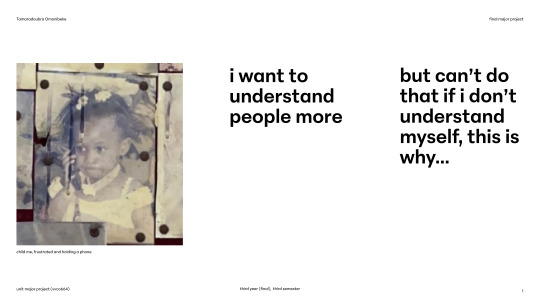
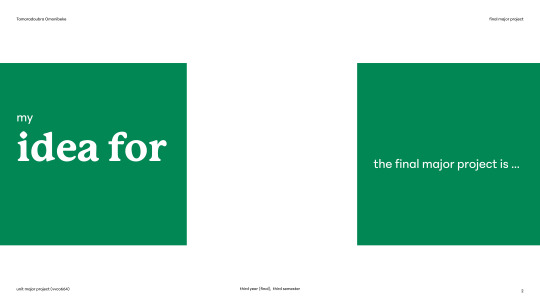
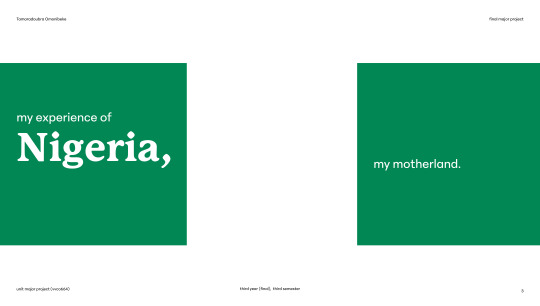
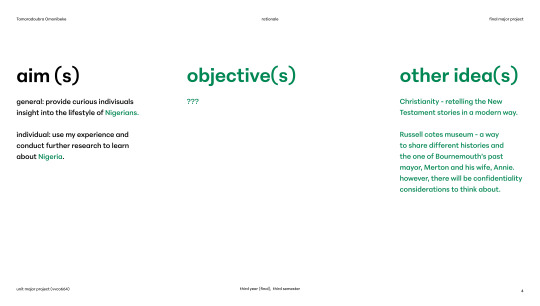
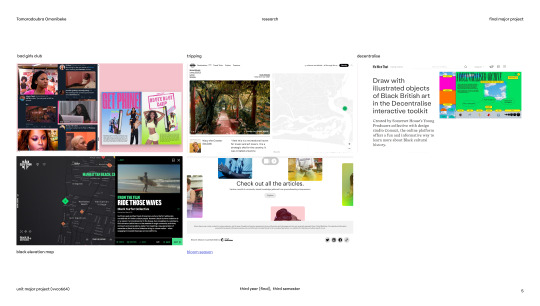
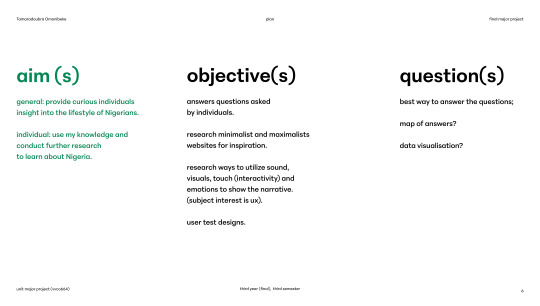
Slide 1 - Throughout the whole presentation, I used lower caps to show a sense of familiarity and how personal this topic is to me. I don't have much photos of myself (especially this young), so I was fortunate to find this photo. I used it not only because it's an available digital photo on hand but weddings are a big celebration back at home and I was part of the bridal train for my aunt's wedding. It's all greyed out because it rained, seeped into my grandparent's home and destroyed the pictures of grandchildren on the red board (I appreciate my grandma for keeping such a commemorative photo).
Okay, now the introduction to this idea basically starts with me talking about how I as UX designer struggle with empathy. To empathize doesn't fully mean to understand someone but it's an essential skill of a UX designer to consider how users will feel regarding certain decisions. However, how can I empathize when I've struggled with an identity crises from my religion to ethnic background (just because I can't speak my first language, Ijaw or gone to my home village, people often feel I'm not Nigerian enough) . I mean, no-one really knows who they are but at least, I should have some basic acceptance of my identity.
Slide 2 and 3 - I wanted to be dramatic and if you already have an idea from the flag, you can tell it's Nigeria. For this presentation, I aimed in getting my idea understood, rather than putting a lot of sketches and prototypes (I had problems visually the idea so I looked forward to this presentation as a way to get inspiration)
Slide 4 and 6 - In Visual Communication, our briefings often have aims and learning outcomes. Back at home, a similar format was used to introduce topics which is aims and objectives so I took inspiration from that.
I've noticed in the past, I've had so many IDEAS and this has led to me being unable to fully design and visualize them. This is why I limited my plans to aims and objectives. I aim to not only learn about myself but help enlighten others. On the same pages with the aims, I add the other ideas I had. This shows I didn't limit myself and thought of other ways to approach the FMP.
The objectives are the ways/methods in which I try to achieve set goals. This is through getting the content (asking questions and answering them), using key features of good design; touch, visual and sound (obviously can't get smell and taste). There's also an emotional aspect to it. I want people to feel and experience as much as they can through a digital platform. This is why I decided to ask research questions in the first place.
Slide 5 - This is research I looked at. It's all websites and the keywords I used were 'culture' in it'snicethat. Thus, every single example is related to ways in which websites were created to allow others the freedom to understand and explore other cultures. I also put in keywords like websites, web trends but to no avail, this is what I obtained. I felt I hadn't done enough compared to some other presentations but realized it's more about getting the point across. A significant website I looked at was black elevation.
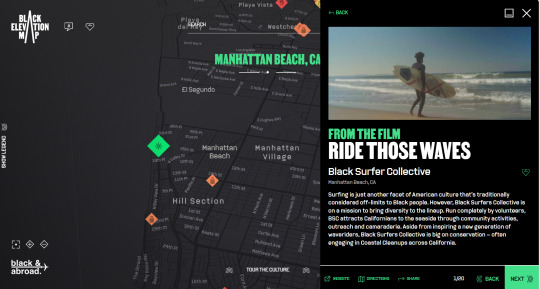
It's a map and website which essentially has 3D elements (visuals) and users navigate pre-dominantly black places in South America . I think it'd be a good idea to create something similar.
Dot's Feedback
I needed to consider if this a super personal project about my experience or about the people. Although, it's great to talk about the history and all but like she stated, my personal experience is something no-one else can tell. Thus, I'm thinking of leaning on that idea.
She suggested creating a kiosk rather than a regular website which I found insightful.
This was a recommended website/kiosk to garner research from.
Market | Meet Engine. The perfect taste explosion.
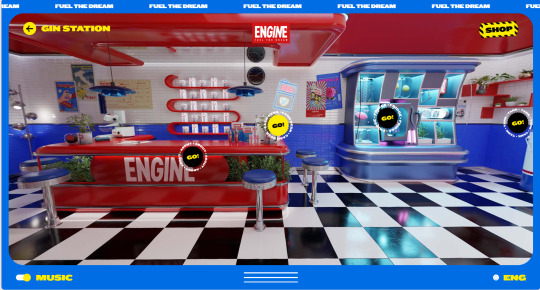
It displays an interactive 3D experience of a racer and 70's inspired restaurant serving the best gins. The navigation is sleek and simple. I haven't had an experience this delightful and there's optional music in the backdrop. The cursor design also resonated with me, back when I played web games as a child.
Next steps
Obtain content (not main priority but I will ask the questions) Also, I'm considering
Learn Figma (prototyping) and Spline for 3D models. If time is patient with me, I'll be able to design it on Webflow.
0 notes
Text








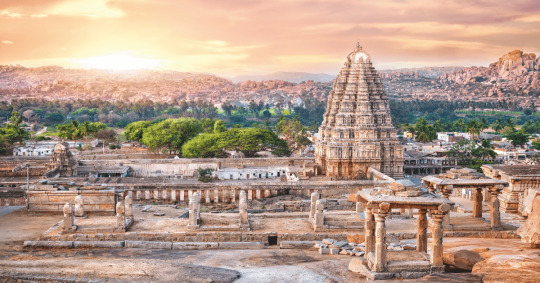
Embark on a Spiritual Sojourn with Darashan App: Unveiling the Mystique of India's Temples
India, a land of myriad cultures and ancient traditions, is home to some of the world's most magnificent temples, each echoing tales of spirituality and architectural splendor. If you're seeking a profound connection with divinity, look no further. Darashan App is your key to unlocking the spiritual treasures of India's famous temples, ensuring an immersive and seamless journey that transcends the ordinary.
Why India's Temples?
Spiritual Haven: India's temples are more than architectural marvels; they are sanctuaries of spirituality. Immerse yourself in the serene ambiance, where ancient rituals and devotional hymns create an atmosphere that touches the soul.
Architectural Marvels: Witness the grandeur of centuries-old architecture, from the intricately carved sculptures to towering spires that seem to touch the heavens. Each temple narrates a unique story of artistry and devotion.
Cultural Tapestry: India's temples are woven into the fabric of its diverse culture. From the opulent temples of South India to the ancient wonders of the North, each region boasts a distinct cultural tapestry waiting to be explored.
Your Journey Starts Here: Darashan App - You’re Virtual Temple Guide
Comprehensive Temple Listings: Browse through an extensive database of famous temples, complete with historical insights, architectural highlights, and essential travel information.
Interactive Maps and Itineraries: Seamlessly plan your pilgrimage with our interactive maps and curated itineraries. Whether you're a solo traveler or in a group, our app ensures you don't miss any sacred spot.
Real-Time Updates: Stay informed about temple timings, festivals, and special events. Maximize your experience by being part of the vibrant rituals that define each temple.
Exclusive Offers and Packages: Avail exclusive deals and packages for a hassle-free journey. From accommodation to transportation, we've partnered with trusted services to make your pilgrimage memorable.
Darashan.com Your Online Sanctuary for Temple Exploration
Temple Tales and Traditions: Dive into the rich narratives of our blog, where we unravel the myths, legends, and spiritual teachings associated with each temple. Gain a deeper understanding of the cultural and historical significance.
Visual Delights: Explore high-quality images and videos capturing the essence of each temple. Let the visuals transport you to the sacred realms, igniting a sense of anticipation for your upcoming pilgrimage.
Community Engagement: Connect with fellow travelers, share your experiences, and seek advice from those who have treaded the spiritual path. Our community is a hub of inspiration and insights.
Reviews and Testimonials: Read firsthand accounts from pilgrims who have used Darashan App. Let their stories inspire and guide you on your journey, reinforcing the reliability and effectiveness of our services.
How to Begin Your Spiritual Odyssey:
Download Darashan App: Available on iOS and Android, our app is your pocket guide to India's temples. Download it today to start planning your spiritual adventure.
Explore Darashan.com: Visit our website to discover a wealth of information, from temple histories to travel tips. Get a glimpse of the beauty that awaits you.
Join the Community: Connect with us on social media and become part of a community that shares a passion for spiritual exploration. Share your stories, seek advice, and inspire others on their journey.
Embark on a Journey of a Lifetime:
India's temples are waiting to unfold their secrets to you. Let
Darashan App and Darashan.com be your companions on this transformative journey. Download our app, explore our website, and step into a world where spirituality meets serenity. Your path to divine discovery begins here. Start your odyssey today.
#indiantemple#templesofindia#india#temple#indianarchitecture#indiantemples#templephotography#ancienttemple#templearchitecture#heritageofindia#hindutemple#incredibleindia#ancientarchitecture#ancientindia#indianmonuments#hinduism#travelindiagram#tourismindia#hindu#indianhistory#templevisit#visitindia#indianculture#indiatravels#ancient#harharmahadev#shiva#mahadev#amazingindia#krishna
1 note
·
View note
Text
Introduction to my project Living Ecology.
Ecology:
- the study of organisms and how they interact with the environments around them.
With the previously focusing on the Human/Nature Divide I am now switching my attention to the other side of that: humans who interact with their environments in different, conscious and symbiotic ways. I want this to be a sort of observation, or tribute, to considering the way we live: in conscious harmony or in stark separation from the natural world.
In the first two weeks of research I started with a broad approach, looking at the literal definition of Ecology, it’s significance and well known ecologists such as John Muir, Rachel Carson, David Suzuki, Jane Goodall… As I researched I began to visualize my graphic media project, a sort of expansion of these humans in ecology in visual form, lino cut prints that lay out visual maps and connections between themselves, their lives and nature.
This is what I will be creating for the visual graphic media project side: a scrawling book of cuts and prints, maybe mixed media alongside, to portray the conscious ecological living that a few humans of my choice are exploring. I would like to create a 12 week project, images of these humans and their stories, as a visual tributary in comment of lives in today’s societies that still remain diverse and consciously directed in ecology.
Immediately, I began to try to remember humans in could bring into this research project. I wanted to research Kimi Werner further; (someone I have been fascinated with for 6 years or so) a woman who explores life as a professional free diver, a mother, a woman with ancestry and community. ( the Haenyeo Women who are free divers and fishers off the coast of Jeju Island, South Korea.) I also began to dig a little further with a video interview: The Green Interviews, David Suzuki, on Being Part of Nature.
Video key notes and phrases that sparked thought:
-the loss and isolation from nature in a world in a highly mobile world,
-drive towards modernity and progress ending in loss of languages and cultures and species leading to a homogenized society.
“Diversity is the key of Life and Resilience in human societies.” D. Suzuki
How can we live that way too? What questions does it raise, what balance is there between our fast paced lives and the consideration, care and connection to the natural world under our feet and in our lungs.
Side Notes: While reading, I heard the phrase Mountain men and River women. It had me thinking of a new shift this research could take…. Who are a few of these humans that live outside the mentality of “Modernity and Progress.”
Having this project start in January, a mentally hard month for me with London grey weather and February being no better, I am really interested to see how this project evolves as spring comes. The concept of living WITH nature almost feels too far away in January and February, but easily imagined in March!
List of sources so far:
Kanopy: the Green Interview, David Suzuki: on Being Part of Nature.
Video and website sources:
youtube
0 notes